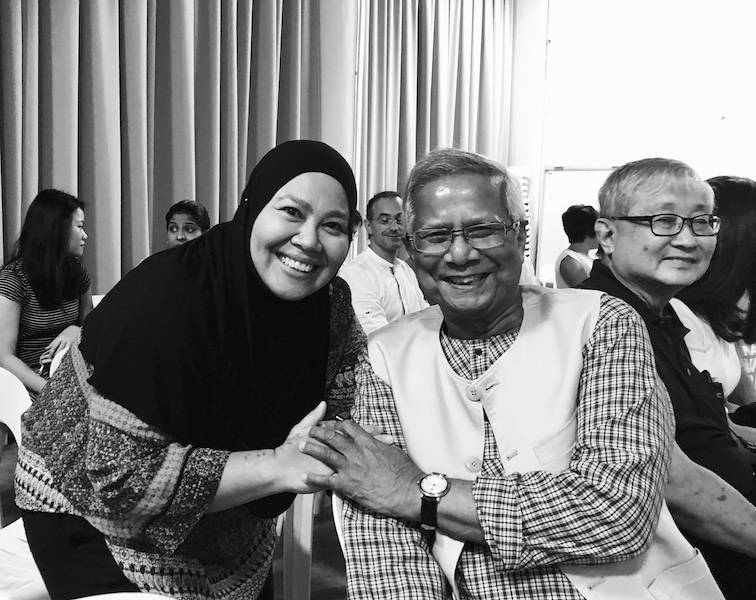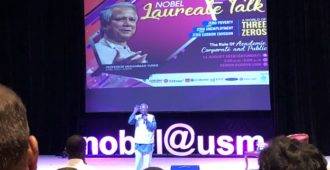It was a Sunday. A dialogue with Prof. Yunus on a Sunday morning, 9.30 am in town. I was in two minds–to go or not to go. I am not a morning person. May take a while to rev up my brain. Caffeine helps. Extra doses of medium roasted Colombian coffee. The thought of beautiful coffee aroma awakened me…
Then I remembered I wanted to ask Prof. Yunus a question. Due to limited time during his talk on Saturday, the organiser allowed only 3 questions from the floor.
I wondered… the cost of good quality education is on the rise, in some places e.g. Ivy League universities, the cost can be quite astronomical. Scholarships are few and highly competitive; study loans may ease the financial burden during studies but upon graduation, students (and their parents) are likely to face a huge debt. These could pose as an insurmountable barrier (and burden) for any students aspiring for a better future–a scenario succinctly potrayed by the following cartoon.

In the face of diminishing financial assistance from the government, I wanted to know if Prof. Yunus thinks education, especially higher education, can run based on his social business model?
I reached Penang Science Cluster (PSC, near Weld Quay) on the dot, but was informed that the dialogue would only start at 10 am. ‘Malaysian time’ I was told.
I had time to kill, and proceeded to explore PSC.
Penang Science Cluster
PSC is a space for Makers, equipped with wonderful facilities, workshops and programmes in coding, woodworking, 3D-printing and many others–as explained by Mr Yeang (PSC Chief Program Officer). PSC is initiated by Penang State and led by industries e.g. Motorola, Intel, HP, B. Braun and Agilent. Borrowing PSC words, their mission is ‘to spark interest in students on science and technology.’ One of their key programmes is Penang International Science Fair (PISF). #notetoself must go and will return to PSC for more exploration.

Racing cars on a Raspberry Pi 
Ju Ping at ease – just before his coding class 
If only a light aircraft decorated
this way in real life
The four C’s of skills
of future workspace
With Nazzeera, the owner-chef of this unique cafe serving yummy kacang phool (fava beans). Her megawatt smile brightens up the whole space! 
Woodworking Space, open to public for a nominal fee. Just bring your own wood–with Mr Yeang
After a quick tour of PSC, I joined the morning dialogue session with Prof. Yunus. It started with a short ice-breaking session – a mix of people from different backgrounds (NGOs, USM, teachers, students, social entrepreneurs) followed by some suggestions from Prof. Yunus–on PSC, the Makers space and how social business can help Penang, in general.
Three takeaways from the dialogue with Prof. Yunus:
- Life-ready rather than job-ready
Universities should prepare students to be life-ready than job-ready. Prof. Yunus asserts that human, by nature, are problem-solvers and entrepreneurs. To be an entrepreneur, one doesn’t need a degree.
A degree is a paper certificate that says one has obtained certain levels of competencies but not necessarily fit for the world out there (life). And to what extent a university’s curriculum address the questions, Who am I? What’s my purpose here on earth? ‘Artificial human’ is what the term he used for university graduates. I’m beginning to feel the longer I stay as an academic, the more distant I am from Truth, for seeking the truth is what I attracted me to universities in the first place #foodforthought
- Does a social business model – a good fit for education?
Prof. Yunus gave an example of a nursing college that Grameen built in partnership with Glasgow Caledonian University. He cited that the ratio of doctors to nurses in Bangladesh is 3 to 1. Nurses are badly needed there. According to him, the Grameen Caledonian College of Nursing accepts children of Grameen families training them as qualified nurses. Everything is provided for including education loans.
Upon graduation they immediately get a job as nurses. Because of high salary they receive, they are able to pay off their student loans in three years. The interest that Grameen charged is 5% – to cover the cost of running the college. Managed under Grameen Health Care Services, the nursing college together with eye hospitals were set up in rural areas of Bangladesh to serve the poor.
To keep cost low and/or offer more affordable education, I also wonder if MOOCs can be a feasible model than a brick-and-mortar institution? And if the offering be operated under a social business model? One example I found is OpenClassroom that a freemium online education provider that focuses on learning paths. Another #foodforthought
- On social business landscape, who’s doing great so far?
Prof. Yunus mentioned France being the leading country in supporting and conducting social business. Apart from big French corporations that are involved in social businesses, Prof. Yunus related that he was in a part of the France Olympic team that won the bid for Paris2024. The French took up his idea of managing/conducting sports and its events as a social business–more here. Noteworthy big corporations with social business ventures are McCain and Danone.
In addition to these three takeaways, the most pressing one is perhaps how does one start a social business? Prof. Yunus’ reply was to go to a poor person and understand his or her needs. Find out the why’s and address those issues upfront.
Another way of looking at this is by turning a charity into a social business to solve the issues, rather a one-off donation. This article and SocialBusinessPedia site might help you.
A game-changer is probably changing how the same game is being played… In my opinion, Prof. Yunus’ brilliant insight and unwavering commitment in translating theories to practices has tremendously helped the most destitutes. It sets up an entirely new game or a new world. A more responsible world.
Social business, through microcredit as an instrument, is about lending opportunities, opening doors to the poor to lead a meaningful and dignified life. It’s about unleashing trapped energy (poverty, unemployment, depression) and allowing the energy to flow and circulate wider.
Setting it free. To follow its own course in Life.
Thanks Powerpoint 😉 The cover picture with Prof. Yunus was a pure coincidence. When he arrived, the organiser ushered him to a seat in front of me. While the organiser was sorting out their Powerpoint presentation, that created a window of opportunity for a quick photo with Prof. Yunus. He happily obliged my request and placed his hand over mine in a fatherly manner. That reminds me of my late dad. It’s been 11 years – miss him terribly… Al-Fatihah.


Comments are closed.